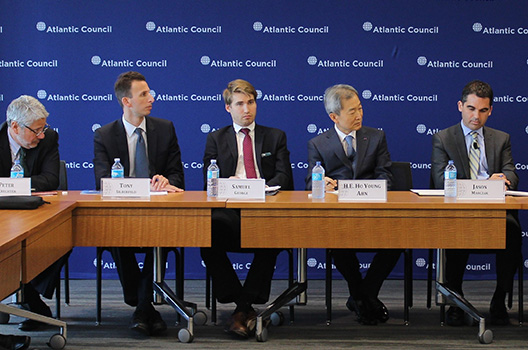 In a few weeks, the presidents of the four Pacific Alliance countries—Mexico, Chile, Colombia, and Peru—will meet in Chile for their 11th Summit. Changing political winds in Mercosur giants Argentina and Brazil hint that we may be on the cusp of greater collaboration between the two blocs. The time is ripe to formalize this rapprochement.
In a few weeks, the presidents of the four Pacific Alliance countries—Mexico, Chile, Colombia, and Peru—will meet in Chile for their 11th Summit. Changing political winds in Mercosur giants Argentina and Brazil hint that we may be on the cusp of greater collaboration between the two blocs. The time is ripe to formalize this rapprochement.
In order to start this agreement process, the Atlantic Council Adrienne Arsht Latin America Center and the Bertelsmann Foundation welcomed Ambassador Ahn of the Republic of Korea, Ambassador Valdes of Chile, and energy expert Ramon Espinasa, for a public address to an invite-only audience Wednesday, May 25, 2016 from 12:30 p.m. to 2:00 p.m. at the Atlantic Council headquarters in Washington, DC. Following Samuel George’s summary of the Council’s new report, Pacific Alliance 2.0: Next Steps in Integration, Jason Marczak moderated a panel discussion with Ambassador Valdes, Ambassador Ahn, and Ramon Espinasa.
Following Peter Schechter’s introductory remarks, Tony Summerfield of the Bertelsmann Foundation commented on his appreciation of the Atlantic Council’s work towards building smarter relationships between countries. Next, Samuel George gave a brief description of the Pacific Alliance 2.0 project. Given the nature of the event, George focused on the project’s proposition for financial integration and energy reforms and how each of the countries represented in the proceeding panel could facilitate the project’s plans.
During the panel, Jason Marczak addresses the questions at the crux of these issues: What are the next steps for the Alliance? What are the benefits for Chile of a deeper partnership with the Asia-Pacific region? What are the next steps, for Chile, to achieve deeper integration with MERCOSUR? And What can the Pacific Alliance learn from the SIEPAC experience in Central America?
